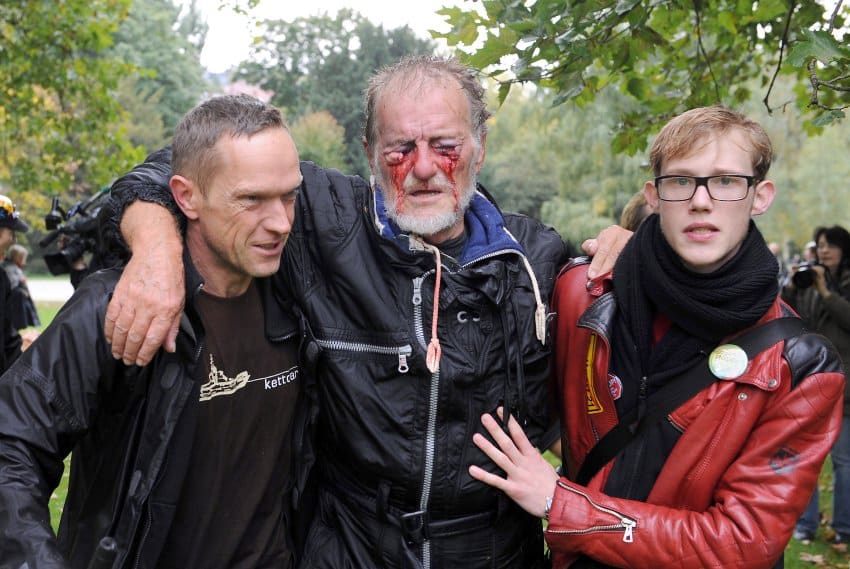 Dietrich Wagner, 66, blinded by police, Stuttgart, 30.09.10 |
A retired engineer of 66 loses an eye, forced from its socket by water cannon at short range. High school kids in an approved protest demonstration get beaten and excruciatingly blinded by pepper gas. Over 400 people are injured in a major police attack, which failed completely in its aim: to end the protests. It happened on the now historical date of September 30th. A whole city was in a state of near shock and anger. And all that because of a railroad station and some ancient trees?
It sounds implausible in the usually calm, relatively well-off city of Stuttgart, the home of Mercedes-Daimler and Porsche. The capital of the southwest German state of Baden-Wurttemberg, which has been ruled since 1953 by Angela Merkel’s conservative Christian Democrats, together currently with the even more right-wing Free Democrats. What in the world moves thousands, ten thousands, sometimes a hundred thousand usually rather apolitical people to shout, sing, pray, climb trees, and jam the main square with their banners, posters, whistles and drums?
The excitement began in August, when people became aware that their big central station was to be leveled in order to build a modern underground station for high-speed trains. Few people had anything against modern or high-speed, but they liked the almost one-hundred-year-old landmark in the middle of town with its big tower. They loved the open space around it, a park near the former royal palace with 282 tall, two-hundred-year-old chestnut trees. And not many Stuttgart people were eager to have one more business district erected there, even though some apartments would be thrown in. Even fewer liked the idea when they heard that the price of the dubious “Stuttgart 21” project, instead of the originally announced 3 billion Euros or the revised 5 or 7 billion, would most likely total 18 or 19 billion. Lots of schools and other good public buildings could be built or repaired with money like that. Meanwhile Angela Merkel and her ministers were whining incessantly that “we must all tighten our belts,” which means cutting benefits for those who need them most.
The mayor, a CDU man, the governor of the state, also a CDU man, and Angela Merkel in Berlin, a CDU woman, all pointed out that Stuttgart 21 had been approved by the lawmakers years ago and could not be dropped now, when work had already begun. Yet somehow this legally correct argument just didn’t get across, and thousands started wearing buttons with a line drawn through the Stuttgart 21 logo, and they started gathering in front of the station, more and more of them, louder and louder. For a while they demonstrated Monday evenings, like the famous demonstrators in East German Leipzig 21 years earlier. Then they gathered on weekends too, or any other day, sometimes in immense crowds for a city of 600,000 inhabitants.
The mayor sent more and more police, and wrecking crews tore down one wing of the station, which only made people madder. Then came that terrible attack on September 30th, and the pictures of the elderly engineer with both eyes smashed and bloody and of youngsters moaning with burning pepper-sprayed eyes shook the entire nation. The videos of giant old trees being felled further enraged the nature-lovers, who got an injunction against further felling when it was found that a rare, endangered beetle species lives almost only in those trees.
Motivating many people, certainly, was an increasing awareness that a small number of wealthy, powerful companies with close political connections would rake in billions and also the feeling that, despite all parliamentary processes, they had been kept almost entirely in the dark. The official line in Germany has been that voters should elect parties and politicians to represent them and then leave it to them to govern, otherwise keeping their mouths shut. Often that is just what happens. But in recent months they have seen the government chopping away at their livelihoods in so many ways while the big fish profit, largely untaxed and untroubled. Resentment has been growing, and there seem to be many, perhaps after watching demonstrators in France, Greece, and elsewhere, who want to make their voices heard. Merkel said they should wait for election day in the state of Baden-Wurttemberg on March 27th. But by then the trees and the station would be gone.
Politics are indeed involved. The Left, still unrepresented in the parliament there and few in number, has largely gone unmentioned, even when Left leader Gregor Gysi called a special session of the Bundestag in Berlin to take action against the police brutality. The Social Democrats, who had long approved the Stuttgart 21 project, finally climbed onto the bandwagon, but their wishy-washy opposition has won them few friends. It has been the Greens who have pushed their way into the limelight and who will probably prosper most, not only in the southwest but everywhere. As for the two governing parties in the state, both Christian Democrats and Free Democrats stand to lose immensely, unless they can somehow alter the situation before next March. For weeks and weeks they remained absolutely stubborn, but finally had to agree to a mediation attempt by a retired politician, one of the very rare progressive Christian Democrats. A possible solution would be a referendum, common in neighboring Switzerland but almost unknown here. Yet thus far this has been rejected. The end remains uncertain, while the demonstrations continue, rain or shine.
Victor Grossman, American journalist and author, is a resident of East Berlin for many years. He is the author of Crossing the River: A Memoir of the American Left, the Cold War, and Life in East Germany (University of Massachusetts Press, 2003).
| Print
